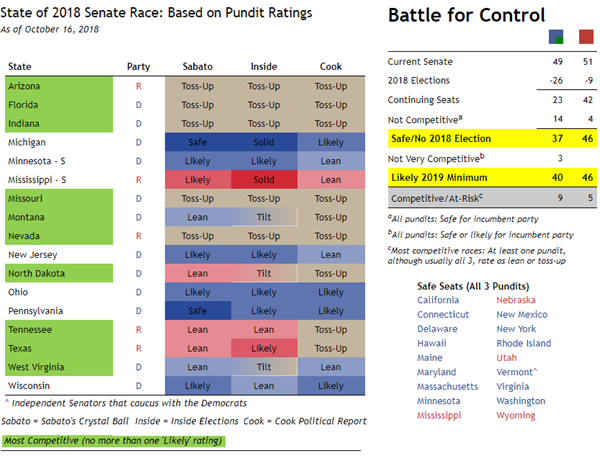Three Weeks Out: Updating the Battle for Senate Control
By 270toWin Staff
October 16, 2018
Defending 26 of 35 seats up for election this year, Democratic prospects for gaining control of the Senate in the 2018 midterms were never all that good. However, an unexpected win in an Alabama special election late last year coupled with more competitive than expected races in Texas and Tennessee gave the party a few narrow but plausible paths to gain the two seats needed. However, recent polling has been less promising. It remains to be seen whether the GOP Senate bump is temporary - a short-term reflection of the Kavanaugh confirmation fight - or one that will carry through to Election Day.
To gain control, Democrats must win 28 of the 35 elections, including a minimum of two Republican seats. The most likely path to that would be holding all of their 26 seats while winning the toss-up races in GOP-held Arizona and Nevada. The problem is that this path isn't all that likely in today's polarized voting era. According to Pew Research, since 2013, 69 of 73 Senate elections have been won by candidates belonging to the party that won the state's most recent presidential race. This year, ten of the seats Democrats are defending were won by Donald Trump in 2016, including five by 18% or more (Indiana, Missouri, Montana, North Dakota and West Virginia).
A loss in any of the 28 seats above obviously means Democrats need to pick one up elsewhere. The only three realistic options are Tennessee, Texas and the Mississippi special election. The other four Republican-held seats are not competitive.
At this point, North Dakota looks to be the most at-risk seat for Democrats. Recent polling there has turned in favor of Republican Kevin Cramer. Polling has also looked better for the GOP in Texas and Tennessee; these are both now rated Likely Republican in the FiveThirtyEight Senate forecast.


